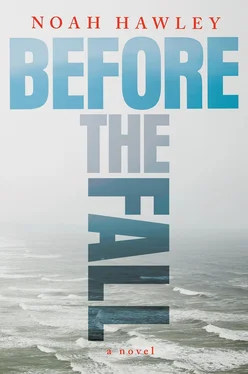“As I said,” says Gus, “I’m with the NTSB. Leslie’s with the FAA and Frank is with OSPRY. And in the doorway is Special Agent O’Brien from the FBI and Barry Hex from the Treasury’s OFAC.”
“The OFAC,” says Scott. “I just saw something about that on the TV.”
Hex chews gum silently.
“If you feel up to it, Mr. Burroughs,” says Gus, “we’d like to ask you some questions about the flight, who was on it, and the circumstances leading up to the crash.”
“Assuming it was a crash,” says O’Brien. “And not an act of terrorism.”
Gus ignores this.
“Here’s what I know,” he tells Scott. “As of now we’ve found no other survivors. Nor have we recovered any bodies. A few pieces of wreckage were found floating about twenty-nine miles off the coast of Long Island. We’re examining them now.”
He leans forward, placing his hands on his knees.
“You’ve been through a lot, so if you want to stop just say so.”
Scott nods.
“Somebody said the boy’s aunt and uncle are coming from Westchester,” he says. “Do we know when they’ll get here?”
Gus looks at O’Brien, who ducks out of the room.
“We’re checking that for you,” says Gus. He pulls a file folder from his briefcase. “So the first thing I need to do is confirm how many people were on the flight.”
“Don’t you have, I mean, an itinerary?” Scott asks.
“Private jets file flight plans, but their passenger rosters are pretty unreliable.”
He looks over his paperwork.
“Am I right in saying your name is Scott Burroughs?”
“Yes.”
“Do you mind giving me your Social Security number? For our records.”
Scott recites the number. Gus writes it down.
“Thanks,” he says. “That helps. There are sixteen Scott Burroughs in the tristate area. We weren’t sure exactly which one we were dealing with.”
He offers Scott a smile. Scott tries to work up an encouraging response.
“From what we’ve been able to piece together,” Gus tells him, “the flight was crewed by a captain, a first officer, and a flight attendant. Would you recognize the names if I said them?”
Scott shakes his head. Gus makes a note.
“Passenger-wise,” says Gus, “we know that David Bateman chartered the flight and that he and his family — wife, Maggie, and two children, Rachel and JJ — were on board.”
Scott thinks of the smile Maggie gave him when he boarded. Warm and welcoming. A woman he knew in passing, small talk at the market— How are you? How are the kids? — the occasional conversation about his work. That she is dead right now at the bottom of the Atlantic makes him want to throw up.
“And finally,” says Gus, “in addition to yourself, we believe that Ben Kipling and his wife, Sarah, were on board. Can you confirm that?”
“Yes,” says Scott. “I met them when I got on the plane.”
“Describe Mr. Kipling for me, please,” asks Agent Hex.
“Uh, maybe five-eleven, gray hair. He had, uh, very prominent eyebrows. I remember that. And his wife was very chatty.”
Hex looks at O’Brien, nods.
“And just so we’re clear,” says Gus. “Why were you on the plane?”
Scott looks at their faces. They are detectives scrambling for facts, filling in missing pieces. A plane has crashed. Was it mechanical failure? Human error? Who can be blamed? Who is liable?
“I was—” says Scott, then starts again, “—I met Maggie, Mrs. Bateman, on the island a few weeks ago. At the farmers market. I would — I went there every morning for coffee and a bialy. And she would come in with the kids. But sometimes alone. And we started talking one day.”
“Were you sleeping with her?” asks O’Brien.
Scott thinks about this.
“I wasn’t,” he says. “Not that it’s relevant.”
“Let us decide what’s relevant,” O’Brien says.
“Sure,” says Scott, “though maybe you can explain to me how the sexual interactions of a passenger in a plane crash are relevant to your — what is this? — investigation.”
Gus nods quickly three times. They are getting off course. Every second wasted takes them farther from the truth.
“Back to the point,” he says.
Scott holds O’Brien’s eye for a long antagonistic moment, then continues.
“I ran into Maggie again Sunday morning. I told her I had to go to New York for a few days. She invited me to fly with them.”
“And why were you going to New York?”
“I’m a painter. I’ve been — I live on the Vineyard and I was going in to meet with my rep and talk to some galleries about doing a show. My plan was to take the ferry to the mainland. But Maggie invited me, and, well, a private plane. The whole thing seemed very — I almost didn’t go.”
“But you did.”
Scott nods.
“At the last minute. I threw some things together. They were actually closing the doors when I ran up.”
“Lucky for the boy you made it,” says Leslie from the FAA.
Scott thinks about it. Was it lucky? Is there anything lucky about surviving a tragedy?
“Did Mr. Kipling seem agitated to you?” Hex interjects, clearly impatient. He has his own investigation and it has little to do with Scott.
Gus shakes him off.
“Let’s do this in order,” he says. “I’m leading this — it’s my investigation.”
He turns to Scott.
“The airport log says the plane took off at ten oh six.”
“Sounds right,” says Scott. “I didn’t look at my phone.”
“Can you describe the takeoff?”
“It was — smooth. I mean, it was my first private jet.”
He looks at Frank, the OSPRY rep.
“Very nice,” he says. “Except for the crashing, I mean.”
Frank looks stricken.
“So you don’t remember anything unusual?” Gus asks. “Any sounds or jostling out of the ordinary?”
Scott thinks back. It happened so fast. Before he could even get his seat belt on they were taxiing. And Sarah Kipling was talking to him, asking him about his work and how he knew Maggie. And the girl was on her iPhone, listening to music or playing a game. The boy was sleeping. And Kipling was— what was he doing?
“I don’t think so,” he says. “I remember — you felt the force of it more. The power. I guess that’s what a jet is. But then we were off the ground and rising. Most of the shades were closed and it was very light in the cabin. There was a baseball game on the TV.”
“Boston played last night,” says O’Brien.
“Dworkin,” says Frank in a knowing way, and the two feds in the doorway smile.
“I don’t know what that means,” Scott says, “but I also remember music. Something jazzy. Sinatra maybe?”
“And did there come a time when something unusual happened?” Gus asks.
“Well, we fell into the ocean,” says Scott.
Gus nods.
“And how exactly did that happen?”
“Well — I mean — it’s hard to remember exactly,” Scott tells him. “The plane turned suddenly, pitched, and I—”
“Take your time,” says Gus.
Scott thinks back. The takeoff, the offered glass of wine. Images flash through his mind, an astronaut’s vertigo, a blare of sounds. Metal shrieking. The disorienting whirl. Like a movie negative that has been cut and reassembled at random. It is the job of the human brain to assemble all the input of our world — sights, sounds, smells — into a coherent narrative. This is what memory is, a carefully calibrated story that we make up about our past. But what happens when those details crumble? Hailstones on a tin roof. Fireflies firing at random. What happens when your life can’t be translated into a linear narrative?
“There was banging,” he says. “I think. Some kind of — I want to say concussion.”
Читать дальше












